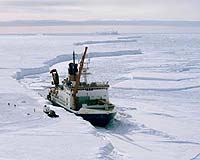| . |  |
. |
Washington (AFP) Sept 27, 2009 Changes appear to be in store this week for the low profile but powerful body that administers the Web. The Internet Corporation for Assigned Names and Numbers (ICANN) is the California-based non-profit that manages the Domain Name System (DNS) and Internet Protocol addresses that form the technical backbone of the Web. Since 1998, ICANN has operated under an agreement with the US Commerce Department's National Telecommunications and Information Administration. The Joint Project Agreement (JPA) expires on Wednesday and a new arrangement is expected to be announced possibly as early as Tuesday. The expiry of the agreement comes at a critically important time with ICANN poised to expand the number of generic top-level domains (gTLDs) such as .com, .net and .org, a controversial move that would greatly increase the number of available addresses. US officials and ICANN members have been tight-lipped about what is in store for the private sector corporation whose structure has been a bone of contention between the United States and Europe and other countries. Viviane Reding, European Commissioner for information society and media, said earlier this year that Europeans expect to see ICANN become a "fully independent organization, accountable to the global Internet community. "It is not defendable that the government department of only one country has oversight of an Internet function which is used by hundreds of millions of people in countries all over the world," she said. The United States does appear ready to loosen its grip somewhat, although ICANN president and chief executive Rod Beckstrom said in a letter to Congress last week that ICANN seeks to maintain a "long term, formal relationship with the United States Government." According to The Economist magazine, a new agreement to be unveiled this week would set up oversight panels that include representatives of foreign governments to conduct regular reviews of ICANN's work. It said the panels will oversee four areas: competition among generic domains, handling of data on registrants, network security and transparency, and accountability and the public interest -- the only panel on which the United States will retain a permanent seat. Unlike previous agreements, the four-page document, called an "affirmation of commitments," has no fixed term, the Economist said. Jeremy Rabkin, a law professor at Virginia's George Mason University, said ICANN's status has always been "amazingly vague" but it's not clear that the reported changes go a long way towards clarifying the situation. "What exactly is an affirmation of commitments?" he said. "I don't know what that is. It sounds like something you'd do in church." Thomas Lenard, president of the Washington-based Technology Policy Institute, noted that numerous parties have suggested changes in ICANN's structure to make it more accountable. "They're basically accountable only to themselves," he said. "It's hard to find another organization in the world which is profit-making and non profit-making, government and non-government and which plays such an important role and operates with the degree of independence that ICANN operates with in terms of external checks," he said. At the same time, Lenard said, the reported changes "seem to imply that they are increasing the role of governments and one of the things that a lot of people were trying to maintain was not to make it a creature of governments." Steve DelBianco, executive director of NetChoice, a coalition of trade associations and e-commerce companies such as Yahoo!, eBay and AOL, has been seeking greater accountability for ICANN. "The Commerce Department has probably crafted an arrangement that reflects what the public comments called for: permanent accountability mechanisms to guide ICANN in the post-transition world," DelBianco said. "I'd expect to see accountability reviews that keep ICANN focused on security, choice and consumer trust, with an added emphasis on interests of global Internet users," he said. Josh Bourne, president of the non-profit Coalition Against Domain Name Abuse (CADNA), which has proposed a full audit of ICANN, expressed concern "that we appear to be moving in the direction of the status quo. "The bright side is maintaining the status quo is better than unraveling any relationship," he said. Share This Article With Planet Earth
Related Links Global Trade News
 Canada, Norway, Russia to provide Arctic sea weather warnings
Canada, Norway, Russia to provide Arctic sea weather warningsGeneva (AFP) Sept 23, 2009 Canada, Norway and Russia will soon provide navigation and meteorological warnings for ships crossing the Arctic sea, a new maritime route which has opened up due to global warming, a WMO expert said Wednesday. A revised Manual on Maritime Safety Information which is to come into force in 2011 now includes the Arctic as a new zone, divided into five areas where weather warnings would have to ... read more |
|
| The content herein, unless otherwise known to be public domain, are Copyright 1995-2009 - SpaceDaily. AFP and UPI Wire Stories are copyright Agence France-Presse and United Press International. ESA Portal Reports are copyright European Space Agency. All NASA sourced material is public domain. Additional copyrights may apply in whole or part to other bona fide parties. Advertising does not imply endorsement,agreement or approval of any opinions, statements or information provided by SpaceDaily on any Web page published or hosted by SpaceDaily. Privacy Statement |